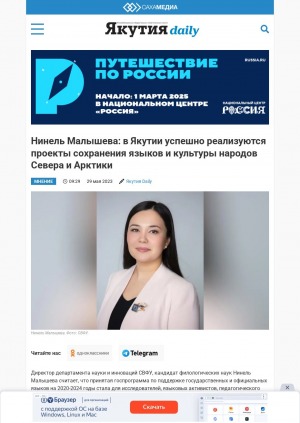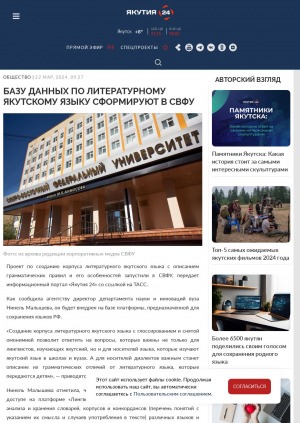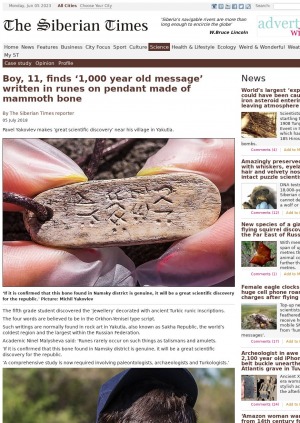Место работы автора, адрес/электронная почта: Северо-Восточный федеральный университет им. М. К. Аммосова, Департамент науки и инноваций, 677980, г. Якутск, ул. Белинского, 58 ; e-mail: nv.malysheva@s-vfu.ru ; https://www.s-vfu.ru
Ученая степень, ученое звание: канд. филол. наук
Область научных интересов: Алтаистика, тюркология, историко-сравнительное изучение тюркских языков, древнетюркские письмена, сравнительно-сопоставительное изучение якутского и корейского языков
ID Автора: SPIN-код: 3352-0996, РИНЦ AuthorID: 778328
Количество страниц: 22 с.
Малышева, Н. В.
Этнолингвистическое описание некоторых диалектных наименований медведя в якутском языке / Н. В. Малышева, Д. Канг ; Северо-Восточный федеральный университет им. М. К. Аммосова, Университет иностранных языков Хангук // Арктика. XXI век. - 2025. - N 1 (39). - С. 54-75. - DOI: 10.25587/2310-5453-2025-39-1-54-75
DOI: 10.25587/2310-5453-2025-39-1-54-75
Источник: Вестник Северо-Восточного федерального университета им. М. К. Аммосова. Серия "Эпосоведение". - 2025. - N 2 (38)
Количество страниц: 23 с.
The present article is devoted to the study of Mongolic borrowings in the language of the Yakut heroic epic olonkho, with a particular focus on lexicon related to inanimate nature (15 items): names of landscape features (8) and atmospheric and natural phenomena (7). As a central element of the Yakut oral tradition, olonkho serves not only as a major source of folklore but also as valuable evidence of linguistic and cultural contact that took place over the centuries. The material for the study consists of olonkho texts recorded by authors from various dialectal regions, which allows for an assessment of the geographic distribution of Mongolic borrowings across the territory of Yakutia. The methodological foundation of the study is based on an ethnolinguistic approach, according to which the vocabulary of olonkho is viewed as a reflection of the traditional cultural and mythopoetic worldview of the Sakha people. In the empirical part of the research, methods of comparative-historical, etymological, and contextual analysis are applied, along with elements of cognitive linguistics that facilitate the reconstruction of conceptual models underlying the functioning of Mongolic loanwords in the epic text. Special attention is given to folkloric-semantic analysis, aimed at identifying culturally conditioned meanings of lexical items and their role in structuring the epic worldview of olonkho. The results of the study indicate an even distribution of Mongolic elements across all dialect zones, confirming long-standing and intensive contact between the ancestors of the Sakha and Mongolic-speaking peoples. Furthermore, many of the examined borrowings demonstrate a high degree of integration into the Yakut language and are scarcely perceived by native speakers as foreign elements. This points to the deep adaptation of Mongolic lexicon and its organic incorporation into the Yakut linguistic system. The findings contribute to a deeper understanding of linguistic interaction and the ethnogenetic processes of the Sakha people, while also offering new prospects for further research in the fields of historical linguistics and folklore studies. The article may be of interest to folklorists, epic scholars, linguists, students of the humanities, and all those interested in the structure and semantics of the olonkho language as a reflection of the cultural memory of the Sakha people.
Турантаева, Н. В. О некоторых монголизмах в диалектной лексике якутского языка (на материале языка олонхо) / Н. В. Турантаева, Н. В. Малышева ; Северо-Восточный федеральный университет им. М. К. Аммосова // Вестник Северо-Восточного федерального университета им. М. К. Аммосова. Серия "Эпосоведение". - 2025. - N 2 (38). - С. 117-136. - DOI: 10.25587/2782-4861-2025-2-117-136
DOI: 10.25587/2782-4861-2025-2-117-136
Год выпуска: 2022
Год выпуска: 2023
Количество страниц: 14 с.
This article presents a linguistic analysis of Mongolic borrowings in the Yakut language, using the names of fur-bearing animals as a case study. The relevance of this research stems from the need to document and describe one of the less-studied areas of Yakut vocabulary - Mongolic borrowings in the names of fur-bearing animals. This study plays a crucial role in preserving the unique lexical heritage that reflects historical and cultural contacts between the Yakuts and Mongolic-speaking peoples. The aim of the work is to identify and systematise Mongolic borrowings in the domain of fur-bearing animal names and to explore their linguistic and cultural significance within the Yakut language. Tasks include reviewing existing scientific literature, collecting and classifying lexical items, and conducting etymological research. Analysing Mongolic borrowings in the names of fur-bearing animals will reveal features that help understand the evolution of linguistic interactions and the formation of the contemporary linguistic landscape of Yakutia. The article employs methods of semantic, etymological, and comparative-historical analysis. The results of the study demonstrate that Mongolic borrowings hold a significant place in Yakut vocabulary. The research identifies specific morphological and phonetic changes that occurred during the adaptation of Mongolic words into Yakut. Special attention is given to the analysis of semantic changes, including the preservation of original meanings, the use of euphemisms, metaphorical transfers, and semantic adaptation. These aspects reflect deep cultural and linguistic interactions between the Yakuts and Mongolic-speaking ethnic groups. The findings contribute to a broader understanding of lexical borrowing processes and deepen the comprehension of language interactions between different ethnic groups.
Турантаева, Н. В. К вопросу о монгольских заимствованиях в якутской лексике (на материале названий пушных животных) / Н. В. Турантаева, Н. В. Малышева ; Северо-Восточный федеральный университет им. М. К. Аммосова // Вестник Северо-Восточного федерального университета им. М. К. Аммосова. - 2024. - Т. 21, N 3 (97). - С. 159-172. - DOI: 10.25587/2222-5404-2024-21-3-159-172
DOI: 10.25587/2222-5404-2024-21-3-159-172
Количество страниц: 10 с.
- Общественные науки. Образование > Этнография. Обычаи. Жизнь народа. Нравы,
- Языкознание. Филология. Художественная литература > Языкознание и языки. Лингвистика > Якутский (саха),
- НАУКА ЯКУТИИ > ЯЗЫКОЗНАНИЕ. ФИЛОЛОГИЯ. ЛИТЕРАТУРОВЕДЕНИЕ. ХУДОЖЕСТВЕННАЯ ЛИТЕРАТУРА > Языкознание и языки. Лингвистика,
- НАУКА ЯКУТИИ > ОБЩЕСТВЕННЫЕ НАУКИ > Этнография. Обычаи. Жизнь народа. Нравы.
The article focuses on the study of the language of "power" based on the speech forms of Tyghyn Darkhan, a historical figure of the Sakha people, conducted within the framework of ethnolinguistic analysis. The relevance of the research is determined by the need for an in-depth examination of the phenomenon of leadership in the national settlements of the Russian Arctic, as well as the analysis of grassroots perceptions of state governance. This study, based on Yakut folklore materials, contributes to expanding knowledge about the mechanisms of power and leadership in northern sociocultural contexts. The novelty of the study lies in its first-ever approach to analyzing the language of "power" through the lens of Yakut folklore, which allows for the identification of unique features of political discourse. This opens up opportunities to analyze rhetorical strategies, manipulative techniques, and mechanisms for achieving balance in relationships between power and society. The research aims to analyze the language of "power" through the speech forms of Tyghyn Darkhan to identify the ways leadership qualities were constructed and power relationships were established in traditional Sakha society. To achieve this goal, folklore sources related to the image of the hero were studied, key linguistic tools were identified, and their functional roles in political discourse were analyzed. The methodological foundation of the study includes descriptive, comparative-historical, semantic, and discourse analysis. Particular attention is paid to the interpretation of texts in their cultural and historical context. The results demonstrate that Tyghyn Darkhan's language played a significant role in consolidating his authority, fostering social integration, and regulating societal relations. His rhetorical strategies combined traditional and innovative approaches, highlighting his importance for understanding the mechanisms of power in ethnic communities. The findings make a substantial contribution to the development of ethnolinguistics and political anthropology. Future research prospects include extending the analysis to the linguistic practices of other northern peoples, which will deepen the understanding of the role of language in sociopolitical processes in Arctic regions.
Малышева, Н. В. Этнолингвистические особенности языка "Власти" на материале исторических и легендарных героев якутов / Н. В.Малышева ; Северо-Восточный федеральный университет им. М. К. Аммосова // Вестник Северо-Восточного федерального университета им. М. К. Аммосова. Серия. Эпосоведение. - 2024, N 4 (36). - С. 105-114. - DOI: 10.25587/2782-4861-2024-4-105-114
DOI: 10.25587/2782-4861-2024-4-105-114
Год выпуска: 2023
- Учимся говорить на языках народов Севера > За сохранение языков народов Севера Якутии,
- Языкознание. Филология. Художественная литература,
- КНИГАКАН > Общественные науки > Народное образование. Воспитание. Обучение. Профессиональное и среднее специальное образование. Высшее обрзование. Организация досуга.
Год выпуска: 2024
Год выпуска: 2024
Год выпуска: 2018









